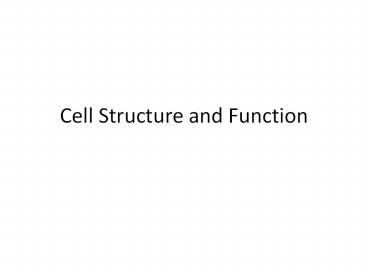Cell Structure and Function - PowerPoint PPT Presentation
Title:
Cell Structure and Function
Description:
Cell Structure and Function Prokaryotes vs. Eukaryotes Prokaryotic Cells - - - Ex. - Eukaryotic Cells - - - Ex. - 5 Kingdom Classification Cellular ... – PowerPoint PPT presentation
Number of Views:136
Avg rating:3.0/5.0
Title: Cell Structure and Function
1
Cell Structure and Function
2
Scientists responsible for the tools and
foundations of cell biology
Robert Hooke
3
Scientists responsible for the tools and
foundations of cell biology
Anton van Leeuwenhoek
4
Scientists responsible for the tools and
foundations of cell biology
Matthias Schleiden
5
Scientists responsible for the tools and
foundations of cell biology
Theodor Schwann
6
Scientists responsible for the tools and
foundations of cell biology
Robert Brown
7
Scientists responsible for the tools and
foundations of cell biology
Rudolf Virchow
8
Cell Theory
The work of these scientists provided information
significant to the development of the cell theory
All living organisms are alike because they are
composed of cells by studying the composition
and chemistry of the cell, we understand the
chemistry and composition of all kinds of life
forms
9
Cell Organelles Their parts, structure, and
function
10
Cell parts come from molecules
- 4 Types of Organic Molecules
- Nucleic Acids
- -
- -
- Carbohydrates
- -
- -
- Proteins
- -
- -
- Lipids
- -
- -
11
Cell Membrane
Function - - - -
Transport Mechanisms
12
Cell Membrane
Phospholipid Bilayer fluid mosaic model
Proteins
Carbohydrates (cholesterol)
13
Nucleus
Functions - -
CHROMATIN -
CHROMOSOMES
14
Nucleus
- - Nucleolus - -
, -
15
Cell Fluids
Plasm Cyto
_________plasm Inside of the nucleus
_______plasm Outside of the nucleus
16
Cytoplasm
Organelles in the cytoplasm of ______eukaryotic
cells Ribosomes Endoplasmic Reticulum Golgi
Apparatus Lysosomes Cytoskeleton Vacuoles Mito
chondria
Organelles in _______eukaryotic
cells Choloroplasts Cell Wall Flagella Cilia
Centrioles
17
Ribosomes
-Tiny structure where _________are assembled from
____________
18
Endoplasmic Reticulum
-
___________ ______________attached,
__________appearance ___________ no
_______________, _________ appearance
19
Golgi Apparatus
- Produces __________, __________, and
__________
20
Lysosome, Vacuoles, and Vesicles
Lysosome
Vacuoles and Vesicles - - -In plants,
- -
21
Cytoskeleton
_____________and __________ network that provides
a ____________ Movement of ___________ inside
cell Movement of the _____________
22
Mitochondrion
Contain their own ____ -
23
Organelles in some eukaryotic cells but not all
24
Chloroplasts
Contain their own ____ -
25
Cell Walls
- - In plants, composed of ________ In fungi,
composed of ________
26
Flagella
____________ structures used for _____________
27
Cilia
________, __________ structures on the surface of
the cell used for ______________
28
Centrioles
Only in _________ cells Used in _____ __________
29
How did the first cells form?
- Oparin Haldane Hypothesis ( s)
-
-
Methane (CH4) Hydrogen gas (H2) Ammonia gas
(NH3) Water vapor (H2O) Very Little Oxygen!!
- volcanic
eruptions UV radiation lightning meteor
bombardment
-
30
Testing the Hypothesis
- Stanley Miller ( )
- - - !!!
___________ -
Molecules Energy
31
Results Theory of How Earths Life Began
Evidence - - - - -
These have all been recreated in the laboratory.
All the steps to making simple cells have been
recreated under lab conditions!!
Molecules of _________
32
Conclusion Theory of How Earths Life Began
1.) 2.) 3.) 4.)
33
Endosymbiont Hypothesis
Lynn Margulis proposed Eukaryotic cell is the
result of
34
Prokaryotes vs. Eukaryotes
Eukaryotic Cells - - - Ex. -
Prokaryotic Cells - - - Ex. -
35
5 Kingdom ClassificationCellular Differences
Prokaryotic Reproduce by Ex.
Eukaryotic - Ex.
Eukaryotic Cell Wall composed of Saprophytic (
) - Ex.
Eukaryotic Cell Wall composed of Autotrophic
-
Eukaryotic Heterotrophic - -































